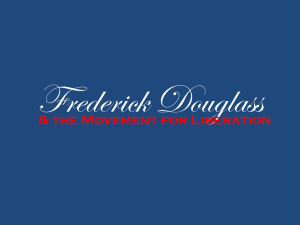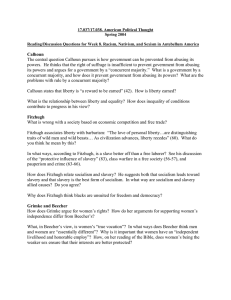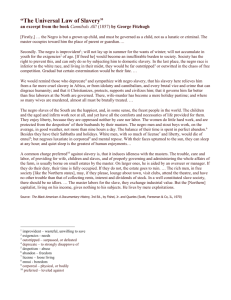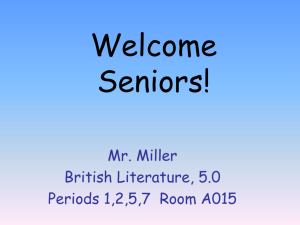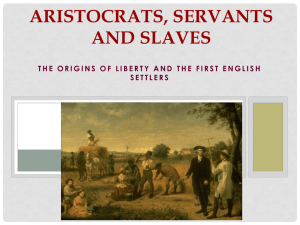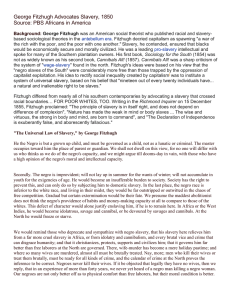rwc_gr10_ideas_under_fire_assessment
advertisement
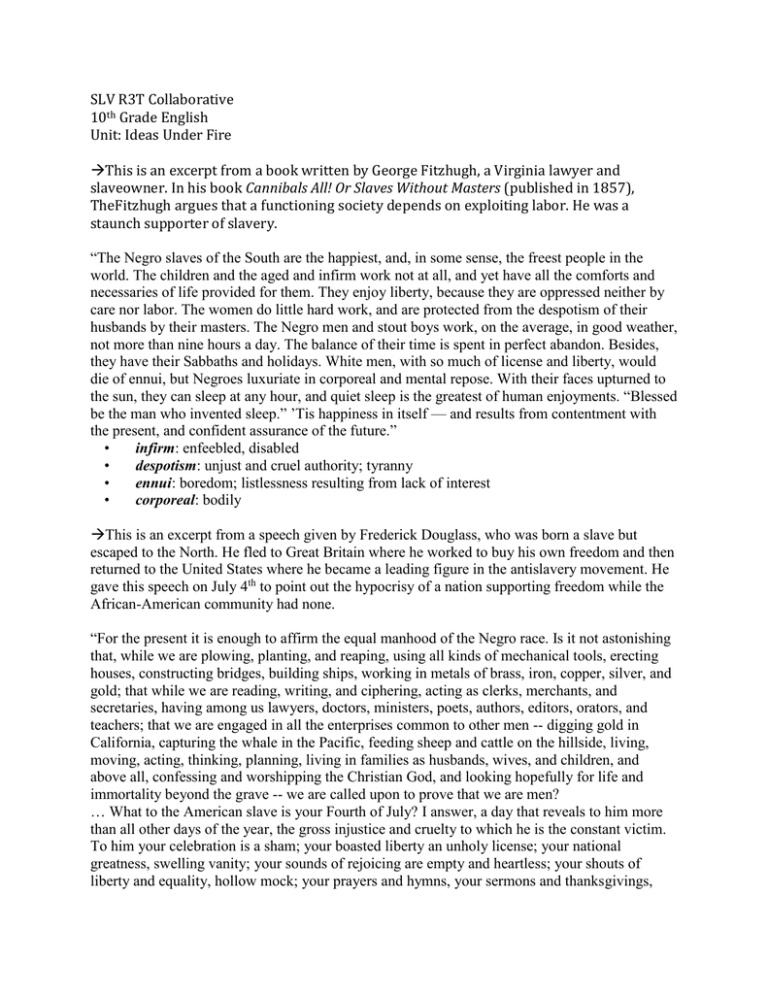
SLV R3T Collaborative 10th Grade English Unit: Ideas Under Fire This is an excerpt from a book written by George Fitzhugh, a Virginia lawyer and slaveowner. In his book Cannibals All! Or Slaves Without Masters (published in 1857), TheFitzhugh argues that a functioning society depends on exploiting labor. He was a staunch supporter of slavery. “The Negro slaves of the South are the happiest, and, in some sense, the freest people in the world. The children and the aged and infirm work not at all, and yet have all the comforts and necessaries of life provided for them. They enjoy liberty, because they are oppressed neither by care nor labor. The women do little hard work, and are protected from the despotism of their husbands by their masters. The Negro men and stout boys work, on the average, in good weather, not more than nine hours a day. The balance of their time is spent in perfect abandon. Besides, they have their Sabbaths and holidays. White men, with so much of license and liberty, would die of ennui, but Negroes luxuriate in corporeal and mental repose. With their faces upturned to the sun, they can sleep at any hour, and quiet sleep is the greatest of human enjoyments. “Blessed be the man who invented sleep.” ’Tis happiness in itself — and results from contentment with the present, and confident assurance of the future.” • infirm: enfeebled, disabled • despotism: unjust and cruel authority; tyranny • ennui: boredom; listlessness resulting from lack of interest • corporeal: bodily This is an excerpt from a speech given by Frederick Douglass, who was born a slave but escaped to the North. He fled to Great Britain where he worked to buy his own freedom and then returned to the United States where he became a leading figure in the antislavery movement. He gave this speech on July 4th to point out the hypocrisy of a nation supporting freedom while the African-American community had none. “For the present it is enough to affirm the equal manhood of the Negro race. Is it not astonishing that, while we are plowing, planting, and reaping, using all kinds of mechanical tools, erecting houses, constructing bridges, building ships, working in metals of brass, iron, copper, silver, and gold; that while we are reading, writing, and ciphering, acting as clerks, merchants, and secretaries, having among us lawyers, doctors, ministers, poets, authors, editors, orators, and teachers; that we are engaged in all the enterprises common to other men -- digging gold in California, capturing the whale in the Pacific, feeding sheep and cattle on the hillside, living, moving, acting, thinking, planning, living in families as husbands, wives, and children, and above all, confessing and worshipping the Christian God, and looking hopefully for life and immortality beyond the grave -- we are called upon to prove that we are men? … What to the American slave is your Fourth of July? I answer, a day that reveals to him more than all other days of the year, the gross injustice and cruelty to which he is the constant victim. To him your celebration is a sham; your boasted liberty an unholy license; your national greatness, swelling vanity; your sounds of rejoicing are empty and heartless; your shouts of liberty and equality, hollow mock; your prayers and hymns, your sermons and thanksgivings, with all your religious parade and solemnity, are to him mere bombast, fraud, deception, impiety, and hypocrisy - a thin veil to cover up crimes which would disgrace a nation of savages. There is not a nation of the earth guilty of practices more shocking and bloody than are the people of these United States at this very hour.” 1.) What image of slavery does Fitzhugh create? Cite specific words from the text to support your answer. 2.) What image of slavery does Douglass create? Cite specific words from the text to support your answer. 3.) How do the images created in both excerpts help develop their arguments? Cite specific words from the text to support your answer. 4.) Determine which of the two excerpts demonstrates fallacious reasoning and distorted evidence, and support your claim with specific textual evidence. 5.) Explain what makes each speaker/author credible in their opposing viewpoints. ___6.) The position from which something is observed or expressed is called a. inference c. rhetoric b. point of view d. style 7.) Which author possesses expert authority? Support your answer! Match the vocabulary term on the left with the correct definition on the right. ___8.) appeal ___9.) credibility ___10.) logic ___11.) insight ___12.) assumptions ___13.) primary source ___14.) secondary source ___15.) opposition ___16.) rhetoric ___17.) seminal a. using language effectively, particularly to make persuasive speeches b. the ability to attract, interest, amuse, or stimulate the mind or emotions c. making a judgement about something without evidence d. a document or object written or created during the time under discussion; diary, letter, article, etc. e. being in a state of disapproval f. a document that interprets or analyzes a primary source g. something very important and influential h. the use and study of valid reasoning i. the capacity to gain an accurate and deep understanding of something j. the quality of being trusted and believed in 18.) What theme do both excerpts deal with? Is this theme still relevant to us today? Support your answer. 19.) What is the historical context for these texts? 20.) Identify two examples of rhetorical devices in either of the excerpts (identify the example and tell what type of rhetorical device it is).
